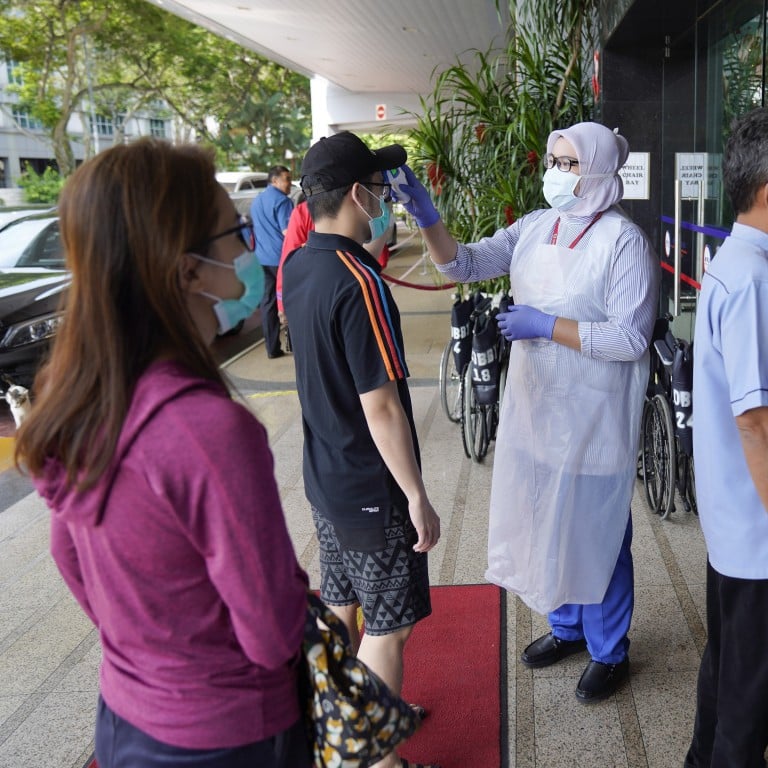
Coronavirus: Malaysia confirms first case of human transmission from Singapore meeting, taking tally to 14
- The 40-year-old woman did not travel to China but her brother became infected after a company meeting at the Grand Hyatt in Singapore last month
- Malaysian health authorities have said people from China including one from the city of Wuhan, the epicentre of the virus, also attended the meeting
The 40-year-old Malaysian woman had direct contact with the man, who had returned to his hometown for the Lunar New Year holiday on January 23, Health Minister Dzulkefly Ahmad said in a statement.
The woman, who does not have a travel history to China, started showing symptoms on February 1, the minister said. Others in the man’s family have tested negative for the coronavirus known as 2019-nCoV.
“We are calling this the first Malaysian-transmitted local case,” Dzulkefly said.
The man had attended a company meeting at the Grand Hyatt in Singapore in mid-January. At least three people, including the Malaysian man, who attended the meeting have contracted the virus, sparking a World Health Organisation investigation of the case.
Malaysian health authorities have said people from China including one from the city of Wuhan, where the virus emerged in December, attended the Singapore meeting.
Dzulkefly said contact tracing for the 40-year-old woman’s brother was ongoing as the authorities sought to locate anyone who had been in close proximity to him.
“We have reached out to 42 individuals so far and taken samples. 41 tested negative for the virus, with the sole positive case being the man’s sister,” Dzulkefly said.
Dzulkefly also confirmed another coronavirus case of a tourist from Wuhan, bringing the total number of cases in the country to 14. Ten of them are Chinese nationals, while the rest are Malaysians – including two who were evacuated from Wuhan this week.
Later on Thursday, Deputy Prime Minister Dr Wan Azizah confirmed Malaysia has expanded its ban on Chinese nationals from Wuhan to include all surrounding areas locked down by the Chinese government.
Meanwhile, a forum in Kuala Lumpur organised by the China-Asean Entrepreneurs Association (ACE) heard Sazaly Abu Bakar, a virologist and biosecurity expert, discuss the threat posed by coronaviruses and the best approaches to confront them.
Sazaly, who runs Malaysia’s Tropical Infectious Diseases Research and Education Centre, praised China’s “incredible” contact tracing methods and for sharing the genetic sequence of 2019-nCoV so all scientists could access it. He also said old age or measles were more likely to kill patients than the coronavirus.
“Things like this stoke a lot of fear, but while 564 deaths is unfortunate and sad ... on a relative scale, it is just a tiny percentage of China’s population, unfortunate incidents,” he said.
Want to avoid the coronavirus? Forget face masks, top airline doctor says
ACE aims to strengthen cultural and economic ties between China and Asean nations. During his opening address to the forum, which attracted about 100 members of the public, Malaysia’s special envoy to China Tan Kok Wai said many Malaysians had spread racially charged “fake news” online.
“This is creating panic among the community. Of course [some] have ulterior motives, like to score points in gaining political mileage for selfish purposes,” he said.
Tang Tang, representing China’s embassy in Malaysia, said viruses “were terrible, but even more terrible than viruses are rumours and panic”.
“The epidemic is temporary, and friendship is long-lasting. In the face of the public health crisis, countries should unite and cooperate to overcome these difficulties,” he said, expressing gratitude to the Malaysian government for its support.
Attorney general Tommy Thomas said those who initiated and disseminated “lies on any issue relating to the coronavirus on the internet” would be investigated and charged if a case was established.
How Wuhan coronavirus spread anti-Chinese racism like a disease through Asia
“I take very seriously the incredible volume of lies relating to the coronavirus epidemic gripping the attention of Malaysians and indeed across the globe,” he said.
“No freedom is absolute in any society at any point of time in history. The constitutionally entrenched guarantees of free speech and expression and the statutorily guaranteed right not to censor the internet ... do not give a licence to propagate lies.”


